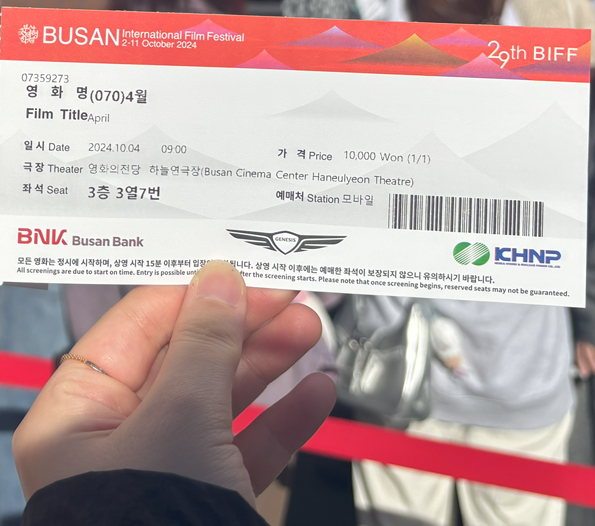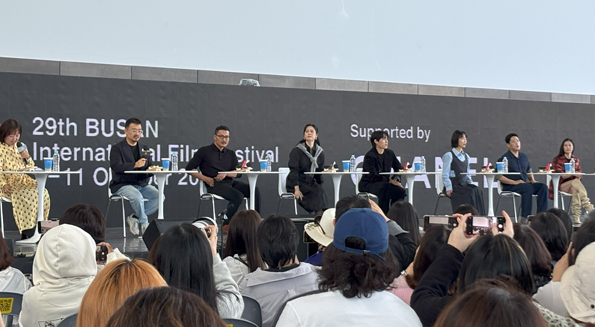
Oct. is recognized as the month of culture. CBT reporter visited Busan, the city of cinema, to attend the 29th Busan International Film Festival (BIFF). The 29th BIFF was held from Oct. 2 to 11, 2024, at the Busan Cinema Center and the Centum City area of Haeundae District. Established as one of Asia’s premier film festivals, this year's event once again served as a grand celebration where filmmakers and audiences from around the world gathered. It provided opportunities for cultural exchange through a wide range of film screenings.
This year’s festival showcased 279 films from 63 countries, starting with the opening film Uprising. This marks an 8% increase compared to last year, demonstrating the festivalʼs ability to maintain its reputation as Asia’s leading film festival despite financial challenges. Highlights of the event included director Kurosawa Kiyoshi receiving The Asian Filmmaker of the Year Award and the screening of his two latest works. Additionally, there were special programs dedicated to Miguel Gomesʼpast films, a section highlighting coming-of-age films for teenagers, and a tribute to the late actor Lee Sun-kyun.
In addition, this year marked the 6th annual 2024 Asia Contents Awards & Global OTT Awards, along with the introduction of the inaugural Documentary Audience Award. The festival also focused on strengthening engagement with the younger generation through collaborations between community programs such as Community BIFF and BIFF Everywhere. Other highlights included the establishment of the Producer Hub at the Asian Contents & Film Market (ACFM) and an AI Conference that explored the future of the film industry.
CBT reporters will share firsthand experiences from the festivalʼs highlights and diverse programs during a two-day visit, offering readers a vivid glimpse into the vibrant atmosphere.
Films Encountered at the Busan International Film Festival
A Delicious Film: The Solitary Gourmet
The Solitary Gourmet is set to officially premiere in South Korea in Mar. 2025. At the film festival, it was selected as an Open Cinema invitation and screened at the outdoor theater of the Busan Cinema Center on Oct. 3 at 8 PM.
The Solitary Gourmet is based on a Japanese manga and has been airing as a television series since 2012. The show features a simple yet engaging premise in which an ordinary office worker seeks out delicious food to enjoy while dining alone in each episode. While the film lacks dramatic plot twists, its detailed food descriptions and the protagonistʼs witty monologues serve as key highlights. Matsushige Yutaka has starred in the The Solitary Gourmet series for an impressive 12 years. In The Solitary Gourmet, Matsushige made headlines by taking on the roles of both lead actor and director. During the premiere, he shared, “Until now, I had simply eaten the meals prepared by the staff and acted according to the directorʼs guidance. However, directing this film and choosing the dishes myself for my character to enjoy provided a unique experience that allowed me to savor the food even more.” In this film, there is a scene that introduces Korean cuisine, which Matsushige expressed excitement about: “I have always enjoyed Korean food and wanted to feature delicious Korean dishes in The Solitary Gourmet. I have also always wished to collaborate with amazing actors in Korea. It is a great honor to have this opportunity.” Additionally, the film features a special appearance by actor Yoo Chea-myung, known for his role as Chairman Jang Dae-hee in Itaewon Class, adding an element of surprise for the audience. The Solitary Gourmet begins with the protagonist, Goro Inogashira, on a business trip in Paris, France. While there, he unexpectedly encounters an old flame and agrees to fulfill a request from her ailing grandfather, who is in a weak state and facing his final days in Paris. The grandfather expresses a desire to taste a soup that his mother used to make for him before he dies. Consequently, Goro embarks on a challenging journey to find the key ingredient for the soup, starting from the Koto, the grandfatherʼs hometown. Throughout this journey, viewers are treated to a variety of culinary experiences, ranging from French cuisine to Japanese and Korean dishes, alongside the heartfelt stories of the people Goro encounters along the way.
Before the screening, Matsushige Yutaka humorously remarked that he hoped the audience would leave the theater feeling hungry after watching the film. Following his words, viewers indeed exited the cinema with an even greater appetite.

Harsh and Cold: April
Invited in the World Cinema section, April is set in a remote rural area of Georgia. The film explores the personal conflicts and societal constraints faced by Nina, a respected obstetrician who secretly performs abortions for desperate women. Through her journey, the film delves into the emotional struggles and ethical dilemmas that arise in the context of restrictive societal norms. The film opens with Nina assisting in the delivery of a stillborn baby for a mother. This event prompts her to reflect on her professional dedication and inner conflicts. In Georgia, abortion is permitted up to 12 weeks of pregnancy; however, in the strongly religious rural society, the procedure is stigmatized, leading many women to avoid it. Particularly, many women lack the means to travel to larger cities, severely limiting their choices. The film illustrates this oppressive social structure through Ninaʼs encounter with a young woman who is even afraid to obtain contraceptives. It also delves into how painful childhood memories influence her current professional choices. An incident from her childhood, where her sister got stuck in mud by a lake, plays a crucial role in shaping Ninaʼs self-loathing and risk-taking tendencies. The film, directed by Kulumbegashvili, conveys the protagonistʼs complex emotions through a realistic portrayal intertwined with fantastical elements, leaving a powerful impression on the audience. The juxtaposition of Georgiaʼs stunning landscapes with a somewhat dark theme enhances its visual excellence. The beautiful panoramic shots and the transcendent quality of everyday elements create a contrast that adds emotional depth and tension to the film. April raises important questions about personal choice, societal oppression, and womenʼs rights, delivering a message that remains timely in todayʼs society. Ninaʼs story is not merely personal; it symbolically reflects the universal challenges faced by women worldwide. While most media depict childbirth as beautiful and blessed, April presents a contrasting perspective, leaving a profound impression on the audience. The film illustrates that for unprepared and powerless women, childbirth is not merely a joy but a complex process fraught with pain and conflict. Its realistic portrayal often leaves the audience feeling breathless with tension. The experiences of women facing unwanted pregnancies remind viewers that Ninaʼs reality is not just a personal issue but a societal one. This prompts the audience to confront profound questions about topics such as childbirth and abortion that remain relevant in modern society. Through its compelling message, tension, and visual elements, the film delivers a powerful impact and fosters a deep discussion about women's rights and choices.
Film Experience Event: Immersing in the Vibrant Atmosphere
The promotional event for the film also captured attention. Deadline portrays the intense struggle for survival against a looming deadline during a typhoon at the Pohang Steelworks. Based on the incident that occurred in Pohang after Typhoon Hinnamnor hit the Korean Peninsula, the experience booth featured props and equipment used in the film. Attendees could also participate in film-related games for a chance to win merchandise.


Bridging Films and Audiences: Special Moments from Outdoor Greetings & Open Talks
As the CBT reporters arrived at the Busan Cinema Center, they immediately went to the program called Open Talks and Outdoor Stage Greetings. These events offer directors, actors of the invited films a chance to introduce their work and engage in open and candid conversations with the audience. The reporters attended the Open Talks and Stage Greetings for Beyond Goodbye, Ghost Train, Born for the Spotlight, and Hellbound: Season 2
During the Outdoor Stage Greeting for Beyond Goodbye, director Kurosaki Hiroshi along with lead actors Sakaguchi Kentaro and Arimura Kasumi, interacted with the audience. This film is a romantic drama that explores the beautiful yet sorrowful miracle of two individuals, and Sakaguchi shared how he portrayed the complexities of his character’s emotions, stating, “Through this role, I aimed to express the various facets of romance.” Director Kurosaki discussed how the lingering emotions after a farewell were captured on screen, highlighting the emotional resonance and lessons audience can expect. Arimura added personal anecdotes from filming, delighting fans with behind-the-scenes stories. The film is set to premiere on Netflix on Nov. 14.
Ghost Train made its debut at the BIFF, featuring six episodes centered around a horror YouTuber’s experiences. Director Tak Se-woong, along with actors Joo Hyun-young and Jeon Bae-soo, were presented at the event. Director Tak explained, “What makes this film intriguing is its blend of everyday desires with a reality-based horror narrative.” He also mentioned the challenges of filming in the confined space of a subway, where limited angles posed difficulties, but noted that these innovative attempts helped set the film apart from traditional horror movies. Ghost Train is slated for release early next year.
At the screening of Born for the Spotlight, director Yen Yi-wen, along with lead actors Hsieh Ying-xuan, Annie Chen, Cheryl Yang, and Olive Ting, engaged with the audience. Director Yen described the film as “A journey where everyone finds their own place,” drawing attention by sharing the challenges faced during production and the insights gained from those experiences. Lead actor Hsieh expressed a desire to connect with the audience through a deep understanding of their character, while Annie Chen hoped that the film would become a meaningful experience for viewers.
At the event for the Netflix original drama Hellbound Season 2, director Yeon Sang-ho and actors Kim Sung-cheol, Kim Hyun-joo, Kim Shin-rock, Moon So-ri, and Im Seong-jae engaged in an in-depth discussion about the series. Season 2 centers around the chaos that ensues in a world disrupted by the resurrection of Chairman Jung Jin-soo, portrayed by Yoo Ah-in in Season 1. Kim Sung-cheol, who takes on the role of Jung Jin-soo in Season 2, shared during the Open Talk that he faced challenges in portraying the characterʼs complex inner conflicts following his resurrection. He expressed his desire to provide audience with a fresh emotional experience through the transformed depiction of Jung Jin-soo. Kim Hyun-joo, who plays the character of attorney Min Hye-jin, shared that the theme of “What is justice?” led her to reflect deeply on the subject. She emphasized the special effort she put into showcasing her characterʼs strength. Director Yeon Sang-ho explained how Season 2 expands upon themes of resurrection and societal issues that transcend religious conflict, noting that the intricately woven stories of the newly intertwined characters are sure to deliver a significant impact to viewers. Hellbound: Season 2 is set to premiere on Netflix on Oct. 25.
Meeting Busan Again: Continuing the Journey of Films
The diverse films encountered at the BIFF offered CBT reporters profound emotions and new perspectives. In particular, the social issues and personal stories captured by directors from various countries provided food for thought, broadening the audienceʼs view of the world through cinema. The films viewed at this yearʼs festival transcended mere entertainment, delving deeply into the complex realities of contemporary society. These works highlighted not only personal experiences but also critical issues such as conflicts between nations and cultures, human rights, and womenʼs rights. In this way, cinema prompted audiences to reflect on their own perspectives while fostering a deeper understanding and empathy for diverse cultures. The BIFF serves not just as a venue for watching films, but as a crossroads where diverse stories converge. Through this experience, audience can directly engage with the powerful messages conveyed by the films, becoming attuned to the myriad voices of contemporary society. As CBT reporters, this special journey in the film city of Busan provided a renewed appreciation for the power of cinema. There is a hope that the BIFF will continue to thrive as a central hub for global filmmaking, and an anticipation builds for the impact of next year’s festival.
By Park Ryeo-won | 2024078018@chungbuk.ac.kr
By Kim Seo-yeon | ssung@chungbuk.ac.kr


 All
All Experience
Experience






 Park Ryeo-won
Park Ryeo-won











